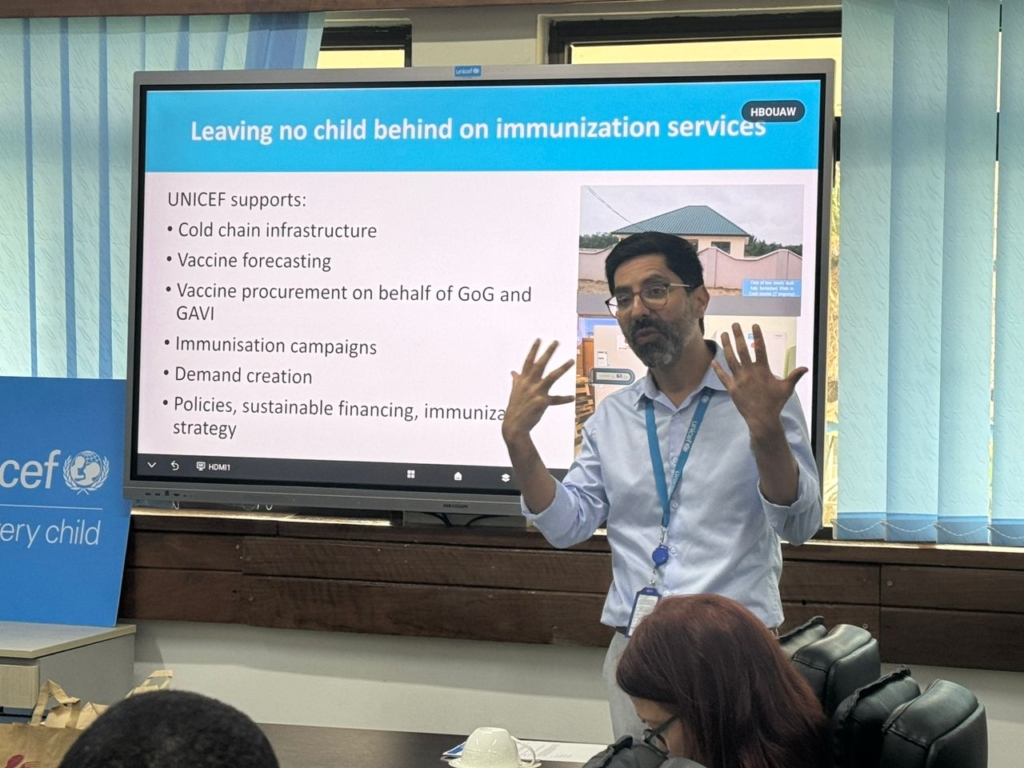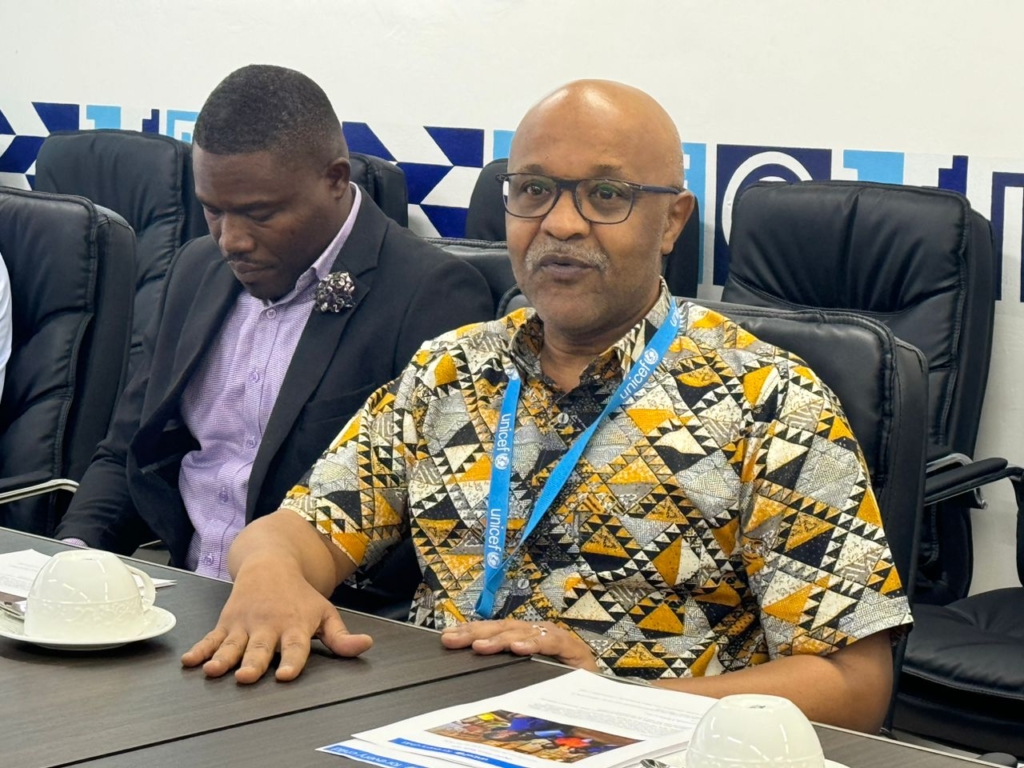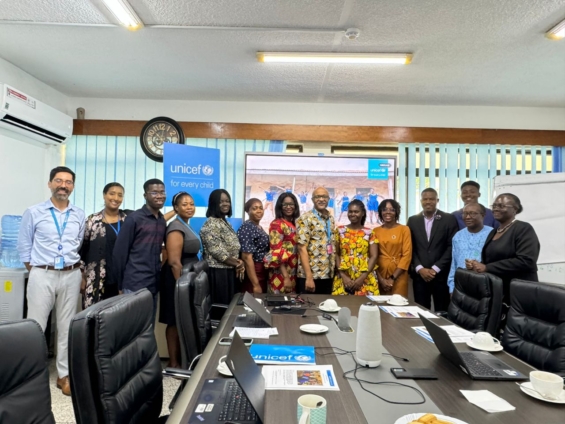UNICEF Ghana says "gaps in care practices and access to quality and inclusive health and nutrition services are impeding the development of children" in Ghana.
The identified gaps in care practices range from neonatal care, vaccination coverage, quality of care for newborns exposed to HIV-positive mothers, environmental health, nutrition, and access to preventive health services as well as general quality of care in health facilities.
Children and adolescent are the most vulnerable to these gaps.
At a Media Café, held to re-engage the media on the core functions of the world’s children-centered humanitarian organization, UNICEF’s Chief of Communication and Advocacy, Fatma Naib, emphasised the importance of preventive intervention supports.
She stressed that while the data on children’s health and nutrition is concerning, there is potential for improvement if everyone understands and acts on their roles and responsibilities.
Ms Naib stated, “the situation can turn around if all and sundry knew their roles and responsibilities to take the necessary actions even before the challenge sets in and subsequently be demanding a national attention for redress.”
A key strategy, according to her, is for "the media to fill in the communication gap to help educate and create awareness among the populace on the responsibilities of all sectors including citizens."
She believes this could lead to faster and more effective behaviour and attitudinal changes compared to relying solely on the government and organisations like UNICEF to shoulder all responsibilities, including preventive actions.
The Media Café focused on the health and nutrition data trends in Ghana, particularly among children. Chief of Health and Nutrition at UNICEF Ghana, Dr. Emmanuel Juan Dewez, presented the latest data.

He highlighted both successes and challenges in areas such as child mortality, quality of care, environmental health, nutrition, HIV infections among newborns, and teenage pregnancy.
On the subject of child mortality and quality of care, Dr. Dewez observed, “over the last three decades, infant mortality reduced from 77 to 40 deaths per 1,000 live births as of 2022. 73% of children aged between 12-23 months have been fully vaccinated against all basic antigens within the same period.
However, neonatal mortality rates and high rates of stillbirths as well as adolescent pregnancy remain major challenges.” He added, “these trends highlight gaps in care, particularly for under-served populations.”
Regarding mother-to-child HIV transmissions, Dr. Dewez revealed, “only 47% of infants exposed to HIV+ mothers had early infant diagnosis tests performed in 2021.
The time of reporting the results has also reduced from 90-180 days to 1-5 days.” He described this as significant progress compared to previous years.
In support of neonatal care, the UNICEF Chief of Health and Nutrition said, the organisation has "supported the establishment of level 2 New Born Care Units in 7 districts and will complete the construction of two regional level Newborn Care Units to serve as referral centers this year, 2024."

Malnutrition, stunting among children, and anemia among adolescents and women of childbearing age remain persistent nutritional challenges.
The latest data show that 17% of children under 5 are affected by stunting, 12% are underweight, 6% are wasted, and 49% are anemic.
Additionally, 40% of women aged between 15-49 years and 43.8% of adolescents aged between 10-19 years are anemic.
Despite these concerning data trends, UNICEF Ghana Country Representative Osama Makkawi remains optimistic.
He praised Ghana for her achievements in development, democracy, peace, and security. Makkawi stated, "Ghana, on the whole and among its peers in the region, has done great. My motivation to work in Ghana is largely driven by the tremendous successes she has achieved."
He is confident that with the support of the media and all stakeholders, issues relating to children’s welfare will receive the right attention and timely response.
Latest Stories
-
Mobik Energy CEO raises alarm over Tarkwa’s disappearing rivers and environmental neglect
31 minutes -
Former Nigerian President Muhammadu Buhari dies in London
58 minutes -
Hard work, not betting, will secure your future -Mobik Energy CEO advises Tarkwa Youth
1 hour -
GIA boss debunks claim payment misconceptions as ‘Street Insurance Campaign’ educates public
1 hour -
Asempa FM’s Ekosiisen supports renal patients with GHS100K, urges gov’t to absorb full cost of dialysis care
2 hours -
WAFCON 2024: We have ‘good options in attack’ – Bjorkegren backs Queens to improve goalscoring
2 hours -
Vice President convenes strategic stakeholder meeting on Women’s Development Bank
2 hours -
Bawumia visits Hawa Koomson after violent attack during Ablekuma North rerun
2 hours -
Bawumia visits assault victims in Ablekuma North rerun; pledges support
2 hours -
Mahama charges Transport Minister and Attorney-General to resolve unauthorised shipping charges
2 hours -
Mahama engages freight forwarders on 24-Hour Economy
2 hours -
Rejecting top-bottom tyranny: NPP must reclaim its soul – Activist
3 hours -
NFFA elects Michael Kwetey Tetteh as its president
4 hours -
NPP outlines guidelines ahead of 2025 National Delegates Conference
4 hours -
Ken Ofori-Atta’s extradition: FBI clears first major hurdle – No witch-hunt
4 hours

